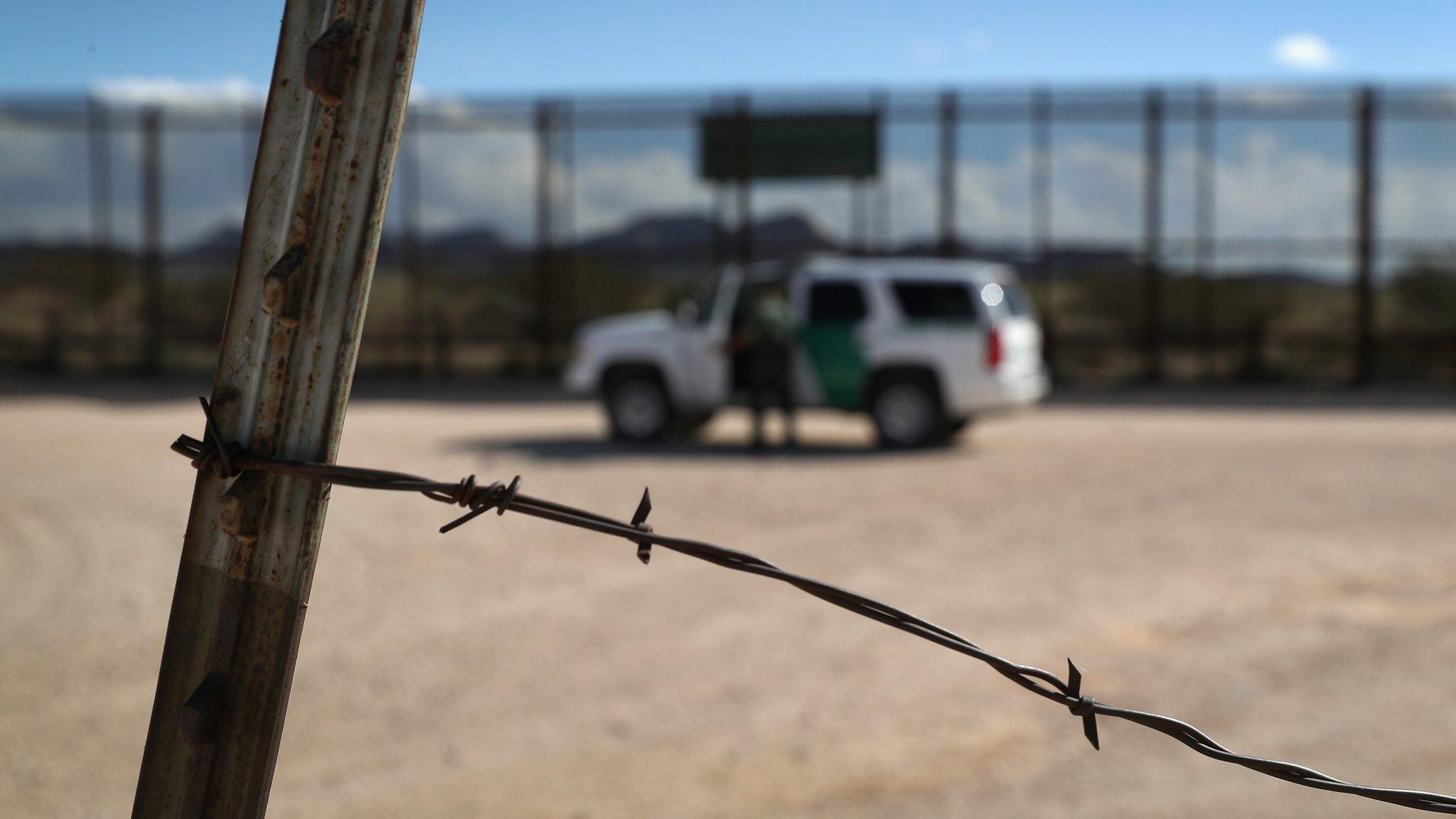Trump reveals unorthodox foreign policy views
- Published
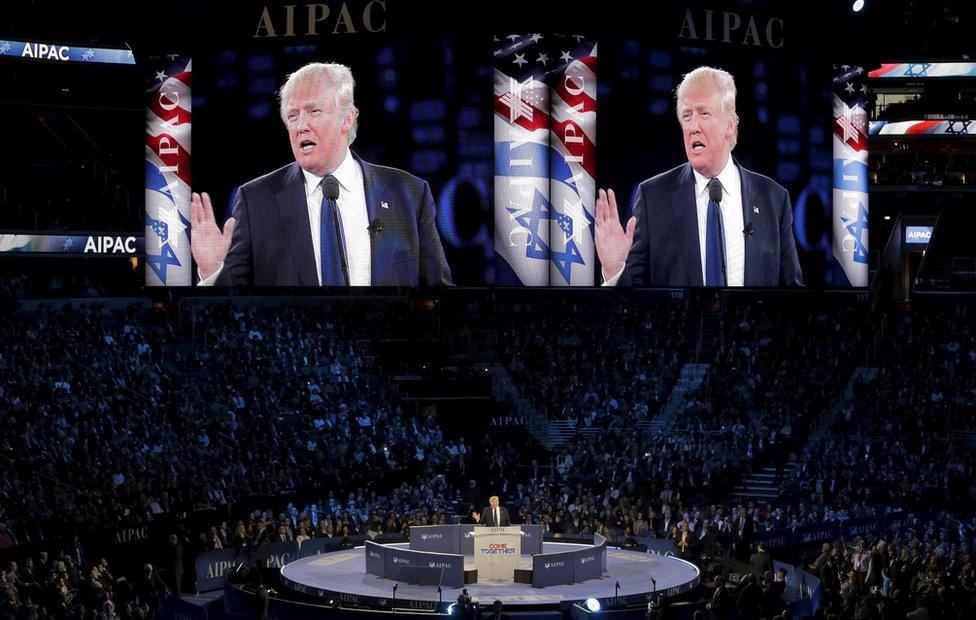
Donald Trump told the Aipac gathering he wanted to dismantle the Iran nuclear deal
On Monday evening Donald Trump gave what was billed as a major foreign policy address to the American Israel Public Affairs Committee (Aipac). Scripted and read from a teleprompter, it was decidedly different in style from his standard, off-the-cuff campaign speeches.
Aside from the now obligatory reference to Mr Trump's turn as grand marshal of a 2004 Salute to Israel parade in New York and a closing mention of his daughter's conversion to Judaism, however, it was a speech that could have been delivered by any of the Republican presidential candidates this year not named Rand Paul.
More revealing of Mr Trump's often conflicting, sometimes unorthodox and still somewhat inchoate worldview were events earlier in the day, when the Republican front-runner gave an on-the-record interview with the Washington Post editorial board. He was pressed on his views on foreign affairs and revealed, after more than a month of delays and promises, the names of some of his foreign policy advisers (not named Donald Trump, external).
Here are a few of the things we learned.
Trump's team
"I hadn't thought of doing it, but if you want I can give you some of the names."
The men (and they're all men) who have Mr Trump's ear on foreign policy matters are a motley collection that includes an energy industry executive, a ex-adviser to Ben Carson only seven years removed from college, a retired general, an academic with ties to Lebanese Christian militants and a former defence department official who later worked for a military contractor.
"The list of five men includes no heavyweights from any of the main schools of foreign policy thought," writes Sara Jerde in Talking Points Memo, external.
According to Ben Chang, a National Security Council veteran of both the Bush and Obama administrations, the list is too little, too late and amounts to nothing more than a confusing "hodgepodge".
"You can tell a person by the friends they keep, and you can tell a person's foreign policy by the advisers he or she gathers," Chang said. "I'm not sure what to make of it. It doesn't seem to be comprehensive by geography or issue. What is lacking is some semblance of a comprehensive worldview."
He said his Bush administration colleagues are firmly against Mr Trump's candidacy, which could explain a collection of names that many of veteran foreign policy hands had to Google.
Even if Mr Trump didn't want to turn to traditional "establishment" international experts, Chang added, he still had plenty of options.
"There are other folks around who are outside the Washington Beltway but have the experiences and perspectives that would give more confidence," Chang said. "The folks I've talked to who have supported a wide range of candidates in the field so far have no desire to join the Trump team because they see his rhetoric and tone as damaging.
Bottom line: If this is Mr Trump's big-splash announcement, it landed with a thud.
European security and international alliances
"Nato is costing us a fortune, and yes, we're protecting Europe, but we're spending a lot of money."
Perhaps the single biggest headline from Mr Trump's remarks at the Washington Post, external on Monday came from his views on European security and the role of US alliances. He said Americans are shouldering too much of a burden among Nato nations - particularly when it comes to Ukraine.
"Ukraine is a country that affects us far less than it affects other countries in Nato, and yet we are doing all of the lifting, they're not doing anything," he said. "And I say, why is it that Germany is not dealing with Nato on Ukraine?"
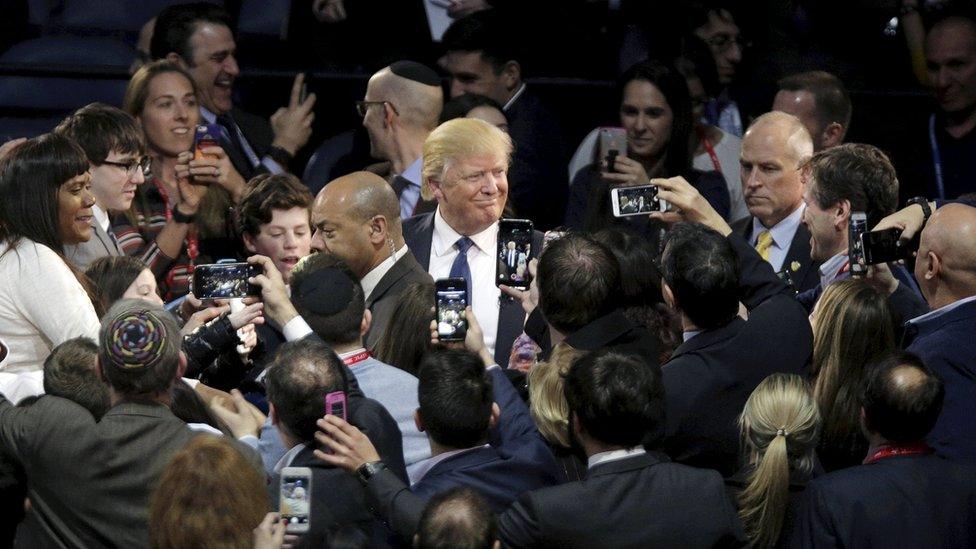
Mr Trump told Aipac he would move the US embassy from Tel Aviv to Jerusalem
He added that the "concept" of Nato is good, but that it is a product of a different time, when the US was wealthier.
Mr Trump's objection to the burdens of current US international commitments isn't limited to Europe either. He also pointed to South Korea as a nation that needs to do more to compensate the US.
"South Korea is very rich," he said. "Great industrial country. And yet we're not reimbursed fairly for what we do. We're constantly, you know, sending our ships, sending our planes, doing our war games. We're reimbursed a fraction of what this is all costing."
When told that South Korea pays roughly half of non-personnel costs, Mr Trump wondered why it wasn't 100%.
According to Mr Trump, the US needs to turn its focus to the problems it has at home.
"I know the outer world exists, and I'll be very cognisant of that, but at the same time, our country is disintegrating, large sections of it, especially in the inner cities," he said.
Bottom line: Nation-building-begins-at-home rhetoric is not unfamiliar to US politics, but it's unusual to hear it from someone on the verge of winning the Republican nomination.
China and trade
"China feels very invincible... They have drained so much money out of our country that they've rebuilt China."
One clear point of departure between Mr Trump and the bulk of the Republican establishment is on the issue of trade. Over the course of the campaign, Mr Trump has repeatedly condemned what he views as unfair trade deals that have allowed countries like China to benefit at the expense of US jobs. He's said he supports free trade but not "stupid trade".
"I feel that we have had horrible negotiators, horrible trade deals," he said at the most recent Republican debate. "The jobs in this country are disappearing, and especially the good jobs."
Mr Trump offered further riffs on this theme on Monday.
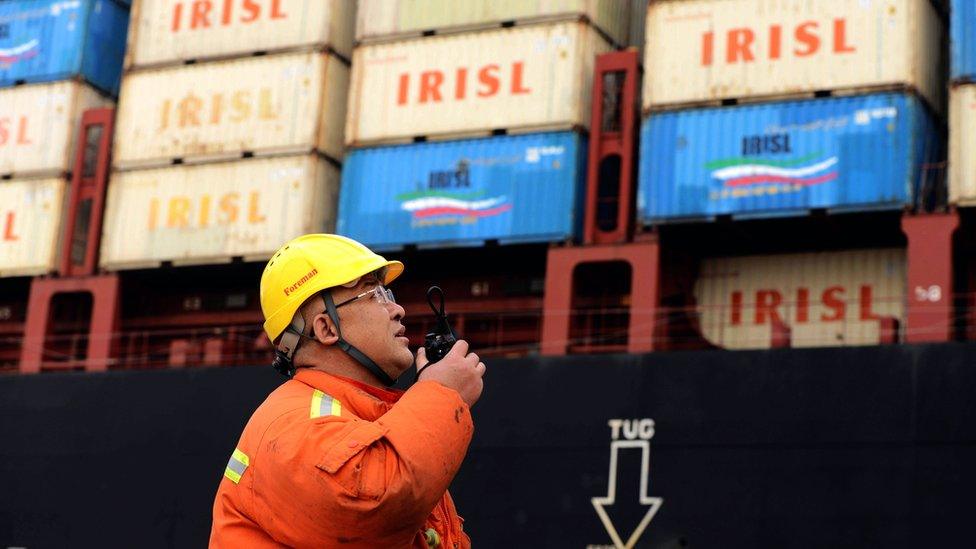
Donald Trump has talked tough on "unfair" trade deals with China
"I have so many people that deal with China - they can easily sell their product here," he said. "No tax, no nothing, just 'come on, bring it all in, you know, bring in your apples, bring in everything you make', and no taxes whatsoever, right? If you want to deal with China, it's just the opposite."
In November he set out a four-part trade policy with China, external that included labelling the nation as a currency manipulator, more vigorously enforcing international patent law and ending China's "illegal export subsidies".
He has since threatened the nation with a 45% tax on some imports to gain the upper hand in negotiations.
It's an outlook former Central Intelligence Agency head Michael Hayden recently called "a tremendous danger".
"Look at our numbers globally in terms of what our economy is doing," he told Yahoo News, external. "We are actually pretty healthy. This is not Weimar America."
Bottom line: Although Mr Trump's immigration positions garner all the press, his trade views may be the key to his working-class support.
Israel, Iran and the Middle East
"I would knock the hell out of Isis in some form. I would rather not do it with our troops, you understand that."
During his Washington Post interview, Mr Trump was pressed on whether he would match his bellicose rhetoric directed against the so-called Islamic State (IS or Isis)) with a commitment of US ground troops.
"I would put tremendous pressure on other countries that are over there to use their troops, and I'd give them tremendous air support, because we have to get rid of Isis," he said.
Although he wasn't asked about Russian involvement in the Syrian civil war, in the past he's expressed at least modest support.
"You know, Russia wants to get Isis, right? We want to get Isis. Russia is in Syria - maybe we should let them do it," he said during a debate in September.
At his Aipac speech, Mr Trump recited a litany of what can only be considered mainstream Republican views on the Mid-East, however.
He said he wants to "dismantle" what he termed a disastrous nuclear weapons deal with Iran.
"I've studied this issue in greater detail than almost anybody," he said to some sniggers among the pro-Israel crowd in Washington, DC.
"The biggest concern with the deal is not necessarily that Iran is going to violate it, although it already has, the bigger problem is that they can keep the terms and still get to the bomb by simply running out the clock, and, of course, they keep the billions."

Russia recently announced the withdrawal of most of its forces from Syria
He also denounced the United Nations and asserted that the US would continue its policy of vetoing any resolutions condemning Israel.
"The United Nations is not a friend of democracy," he said. "It's not a friend to freedom. It's not a friend even to the United States of America, where as we all know, it has its home. And it surely isn't a friend to Israel."
Finally, Mr Trump pledged to move the US embassy from Tel Aviv to Jerusalem - a move that is endorsed by many Republicans but would anger US Arab allies.
Mr Trump's remarks stood in marked contrast to his prior assertions that he would set out to be a "neutral" broker between Israelis and Palestinians. It was a position for which he has been criticised by his fellow Republican candidates - and by Democrat Hillary Clinton on Monday morning.
"America can't ever be neutral when it comes to Israel security or survival," Mrs Clinton said at a speech before the same Aipac audience.
Bottom line: Mr Trump began his speech by promising that he wasn't there "to pander to you about Israel" - but by the end of the speech, that assertion was very much in doubt.
- Published21 March 2016
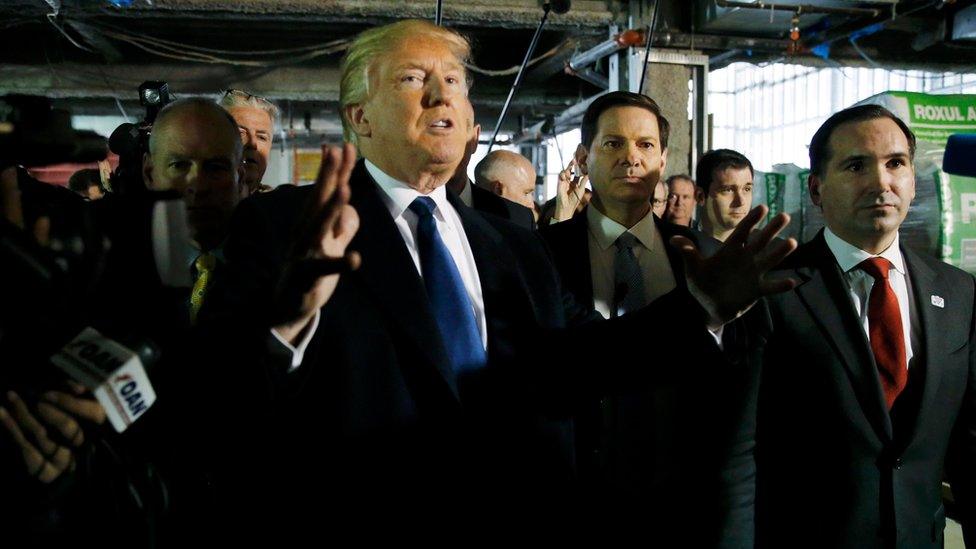
- Published2 March 2016
- Published9 November 2016
